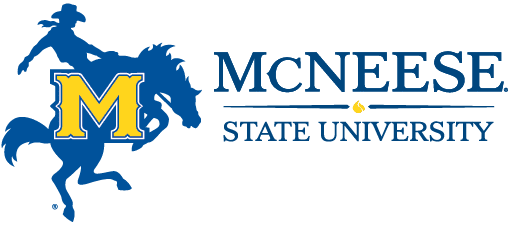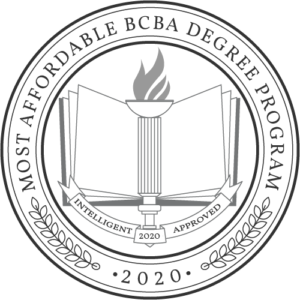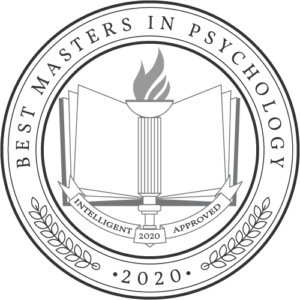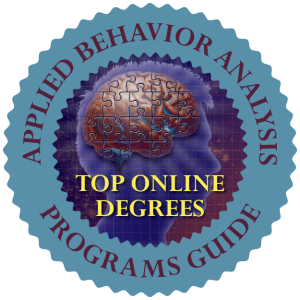Master's Degree Program Highlights
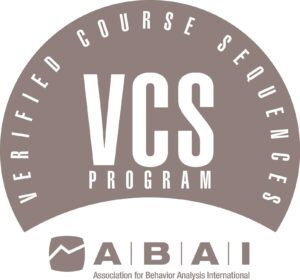 The on-campus (face-to-face) master’s degree in Applied Behavior Analysis (ABA) program at McNeese is accredited by the Association for Behavior Analysis International Accreditation Board and provides students with a well-rounded educational experience. Students acquire a firm foundation in behavior analytic principles and procedures through coursework, completion of an empirical thesis and a site placement at our on-site supervised practicum experience at the McNeese Autism Program (MAP). Students who live within a 50-mile radius of campus receive a site placement at MAP. Our online-only program is not accredited by ABAI®, however, it does feature a VCS approval. Our online-only program is an Academic Program Partner of the Behavioral Health Centers of Excellence (BHCOE). Students in the online-only program who live outside the 50-mile radius of campus receive high-quality supervised experiential learning through BHCOE accredited site-placements.
The on-campus (face-to-face) master’s degree in Applied Behavior Analysis (ABA) program at McNeese is accredited by the Association for Behavior Analysis International Accreditation Board and provides students with a well-rounded educational experience. Students acquire a firm foundation in behavior analytic principles and procedures through coursework, completion of an empirical thesis and a site placement at our on-site supervised practicum experience at the McNeese Autism Program (MAP). Students who live within a 50-mile radius of campus receive a site placement at MAP. Our online-only program is not accredited by ABAI®, however, it does feature a VCS approval. Our online-only program is an Academic Program Partner of the Behavioral Health Centers of Excellence (BHCOE). Students in the online-only program who live outside the 50-mile radius of campus receive high-quality supervised experiential learning through BHCOE accredited site-placements.
MAP is an outpatient treatment center that provides ABA services to individuals diagnosed with neurodevelopmental disorders such as autism spectrum disorder, intellectual disability, attention-deficit hyperactivity disorder and genetic disorders such as down syndrome. These services are designed to improve patients’ quality of life by reducing maladaptive behavior and establishing adaptive, academic, communication, feeding, independent living, social and vocational skills. MAP serves approximately 30 patients of various ages and diagnoses whose programs are implemented by graduate students, supervised by a team of Board Certified Behavior Analysts (BCBAs)® and overseen by the ABA program faculty. Students in the campus program gain a breadth and depth of clinical experience that will prove invaluable following graduation.
The combination of a rigorous course sequence, research experience, comprehensive practicum and outstanding faculty creates scientist-practitioners who excel in their professional environments.
Prepare to sit for your Board Certified Behavior Analyst® exam
A Board Certified Behavior Analyst is a nationally certified behavioral health care professional who provides and supervises behavioral health care services. A BCBA® is qualified to address behavioral problems of social significance, within their areas of expertise, at an individual or group level. McNeese’s ABA program prepares students with all coursework requirements necessary to sit for the BCBA® exam. The campus program provides students with the supervised fieldwork experience (practicum) required to sit for the board exam. Students in the face-to-face program obtain their on-site supervised fieldwork experience through site placement internships at MAP.
McNeese’s on-campus ABA program is the only graduate program in the State of Louisiana—and one of only twenty-eight master’s level programs worldwide—that is accredited by the Association for Behavior Analysis International Accreditation Board®.
The online-only degree program is not currently accredited by ABAI®. Our programs are ABA 5th Edition Task List Verified Course Sequences (VCS) meaning the Association for Behavior Analysis International (ABAI)® has verified the following courses toward the coursework requirements for eligibility to take the Board Certified Behavior Analyst (BCBA)® examination. Applicants will need to meet additional eligibility requirements and demonstrate they reside in an authorized country before they can be deemed eligible to take the examination.
At a Glance
Degree Type: Master of Science (M.S.)
Program Length: 2 years
Availability: online, in person
What can you do with a degree in applied behavior analysis?
According to the BACB (2021) “Over the past 11 years, demand for behavior analysts holding BCBA or BCBA-D certification has increased by 4,209%. Annual demand for individuals holding BCBA/BCBA-D certification has increased each year since 2010, with a 17% increase from 2019 to 2020” (p.1).
Past McNeese ABA graduates have been successful in securing clinical BCBA positions prior to or within weeks of graduation. Many students have secured job placements as board-eligible candidates prior to sitting for their BACB credentialing exams. Recent McNeese ABA graduates work as clinical BCBA staff members in local/regional centers in Southwest Louisiana and Texas. Employers have reliably found that our alumni are highly skilled and well-rounded in their knowledge of ABA. Alternatively, some students choose to pursue doctoral degrees upon graduation. Opportunities for further study and career paths with this degree include:
Graduate Schools or Programs
- PhD in Applied Behavior Analysis
- PhD in Experimental Psychology
Potential Credential and Job Titles
- Board Certified Behavior Analyst®
- Clinical Supervisor
- ABA Service Provider
- Behavioral Consultant
- Training Coordinator
- Animal Behavior Consultant
- School Behavior Analyst
- Special Education Assistant
Potential Specialties
- Non-human Animal Behavior
- Developmental Disabilities
- Behavioral Gerontology
- Behavioral Health and Technology
- Verbal Behavior
- Organizational Behavior Management
- School-Based Behavior Analysis
- Gambling, Addiction, Substance Abuse
Student Activities
Students can join a variety of clubs and networking opportunities such as the International Honor Society in Psychology, Psi Chi.
Community Engagement
Our students stay active in the ABA community by presenting at local, regional and international conferences, including the Louisiana Behavior Analysis Association (LaBAA) Conference, the Texas Association for Behavior Analysis (TxABA) Conference and the annual convention of the Association for Behavior Analysis International (ABAI)®. Students are also encouraged to participate in regularly held fundraising events for MAP.
Special Facilities
The Department of Psychology and Counseling and MAP were located in Farrar Hall on the McNeese campus, which housed office suites, session rooms, classrooms and research laboratories including a rat laboratory and vivarium. The Department is temporarily housed within Hardtner Hall.
Accreditation Information
| Outcomes | 2023 | 2022 | 2021 | 2020 | 2019 | 2018 |
| Number of students whose degrees were conferred by the program. | 3 | 7 | 5 | 7 | 9 | 20 |
| Median years until graduation for students whose degrees were conferred by the program. | 2 | 2 | 2.5 | 2 | 2 | 2 |
| Number of students enrolled in the program on January 1st of the reporting year. | 9 | 13 | 26 | 21 | 22 | 33 |
| Number of students no longer enrolled for any reason other than conferral of degree. | 0 | 0 | 0 | 0 | 0 | 1 |
| Number of completed applications received. | 9 | 9 | 15 | 57 | 47 | 42 |
| Number of students admitted during the reporting year. | 4 | 8 | 3 | 47 | 17 | 21 |
| Number of Core Program Faculty Members. | 3 | 2 | 3 | 4 | 4 | 3 |
| Number of Associated Program Faculty Members. | 1 | 0 | 0 | 0 | 0 | 0 |
| Number of Other Contributors. | 3 | 3 | 3 | 3 | 0 | 0 |
| Number of first-time candidates sitting for their Board Certified Behavior Analysis (BCBA) examination. | 7 | 4 | 5 | 6 | 8 | 18 |
| Percentage of first time candidates passing the BCBA certification. | 64% | 100% | 80% | 83% | 89% | 85% |
| Number of graduates obtaining a master- level state license as a behavior analyst. | 11 | 4 | 5 | 6 | 8 | 14 |
| Number of first-time candidates sitting for their Board Certified Assistant Behavior Analyst (BCaBA) examination. | N/A | N/A | N/A | N/A | N/A | N/A |
| Percentage of first time candidates passing the BCaBA certification examination. | N/A | N/A | N/A | N/A | N/A | N/A |
| Number of graduates obtaining a bachelor-level state license as a behavior analyst. | N/A | N/A | N/A | N/A | N/A | N/A |
| Median undergraduate grade point average (GPA) for applicants admitted (report on a 4-point scale). | 3.49 | 3.13 | 3.34 | 3.69 | 3.5 | 3.4 |
| Median graduate grade point average (GPA) for applicants admitted (report on a 4-point scale). | N/A | N/A | N/A | N/A | N/A | N/A |
| Median score on GRE combined (verbal + quantitative) | 302 | 291 | 289 | 295 | 292 | 289 |
Full Time Faculty
Joanna B. Thompson, Ph.D., BCBA-D – Director and Coordinator of Graduate Programs
Dr. Thompson is a full-time graduate faculty member at McNeese State University, who teaches online and face-to-face courses in the ABA program. She earned her Bachelor’s and her first Master’s Degree in Psychology with a dual concentration in Experimental Psychology and Applied Behavior Analysis from McNeese State University. She then worked on an additional Master of Science Degree in Experimental Psychology from Texas Christian University before earning her Doctoral Degree in Experimental Psychology under the advisement of Dr. Mauricio R. Papini. She has been a Board Certified Behavior Analyst since 2015. Her clinical experience includes early intensive behavioral intervention, verbal behavior, self-injurious behavior, and working with adolescents. She is a past-President of the Texas Association for Behavior Analysis Pediatric Feeding Disorder’s Special Interest Group. Dr. Thompson is a behavioral neuroscientist who studies the neurobiological basis of addictive behavior as it relates to reward. More specifically, her research interests include, but are not limited to identifying the precursors to addiction–before the behavior becomes habitual; understanding the behavioral and brain processes that underly the initiation into substance use, abuse, and other addictive behaviors; and pharmacological manipulations involving alcohol, benzodiazepine anxiolytics, cannabinoids, and opioids.
Sadie Lovett, PhD., BCBA-D – Assistant Professor
Dr. Sadie Lovett, Ph.D., BCBA-D, joined the Department of Psychology at McNeese State University in January 2024 as an Assistant Professor. She is also a Board Certified Behavior Analyst at the doctoral level (BCBA-D).
James Nuse, PhD., BCBA-D – Assistant Professor
Dr. James Nuse, Ph.D., BCBA-D, joined the Department of Psychology at McNeese State University in August 2023 as an Assistant Professor. James Nuse earned his Ph.D. in special education from University of Northern Colorado and completed his Ed.S in administration and supervision from Wayne State University, M.Ed. in special education with a concentration in applied behavior analysis (ABA) from Oakland University, and B.S. in Education from Central Michigan University. He is also a Board Certified Behavior Analyst at the doctoral level (BCBA-D) and has practiced clinically in addition to supervising behavior analysts in training. James has particular research interests related to the intersection of ABA and special education, pediatric feeding disorders, special education litigation (e.g., FAPE and ABA) and the use of emergency intervention procedures such as restraint and seclusion. He is a member of the council for exceptional children and serves as co-chair for the Honors Committee. He is also actively involved in various Michigan professional associations serving children with disabilities in school systems.
Part Time Faculty
Nidal Daou, Ph.D., BCBA-D, joined the Department of Psychology at McNeese State University in August 2017 as an assistant professor. She was promoted to the rank of associate professor in August 2020 and served in this role through July 2021. Dr. Daou also served as the VCS coordinator for the department, online program coordinator, academic adviser and faculty adviser to the McNeese Autism Program. She received her bachelor’s degree from the American University of Beirut (AUB) and master’s from Queens College of the City University of New York (CUNY). She received her Ph.D. in Psychology from the Learning Processes and Behavior Analysis subprogram at the Graduate Center, CUNY. Her research is concerned with social interaction and independent engagement among children on the autism spectrum and cross-cultural conceptions of autism. Her clinical experience started at the New York Child Learning Institute, which is a dissemination site of the Princeton Child Development Institute. There, she administered and supervised service provision for children and youths on the spectrum and developed and implemented individualized educational programs. Upon completion of her Ph.D., she returned to her hometown of Beirut, Lebanon, where she introduced Applied Behavior Analysis (ABA) to her students at AUB, developed and coordinated the first VCS in Lebanon, and published the first ABA research paper concerned with autism in Lebanon before returning to the United States in 2017. Dr. Daou is now a part-time graduate faculty member.
Programs Related to the Master's in Applied Behavior Analysis
Program Contact
Dr. Joanna B. Thompson
ABA Program Director
Coordinator of Graduate Program
jthompson2@mcneese.edu
